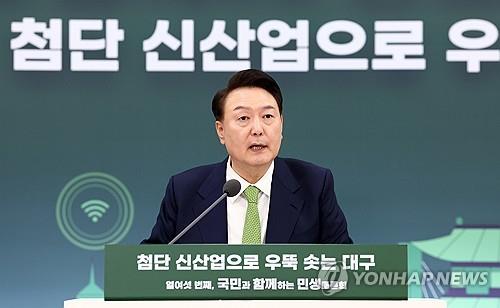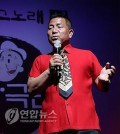- California Assembly OKs highest minimum wage in nation
- S. Korea unveils first graphic cigarette warnings
- US joins with South Korea, Japan in bid to deter North Korea
- LPGA golfer Chun In-gee finally back in action
- S. Korea won’t be top seed in final World Cup qualification round
- US men’s soccer misses 2nd straight Olympics
- US back on track in qualifying with 4-0 win over Guatemala
- High-intensity workout injuries spawn cottage industry
- CDC expands range of Zika mosquitoes into parts of Northeast
- Who knew? ‘The Walking Dead’ is helping families connect
Yoon pledges support for Daegu, including new airport by 2030
President Yoon Suk Yeol on Monday pledged significant support measures for the southeastern city of Daegu, a conservative stronghold, including the opening of a new airport and fostering the robotics industry.
Yoon made the commitments during a government-public debate, the 16th in a series of sessions, held in Daegu, emphasizing the need to modernize the city’s outdated industrial structure and improve its transportation infrastructure. It marked the first time the debate was held in Daegu.
“The government will boldly expand support to enable revolutionary changes in Daegu,” Yoon said, adding that the government aims to achieve the goal of opening the new airport on the southeastern coast by 2030.
The government has planned for the new airport in the nearby areas of Uiseong and Gunwi, both in North Gyeongsang Province, to serve both civilian and military aircraft, replacing the decades-old Daegu International Airport. Construction of the envisioned airport is set to commence in 2025.
Yoon highlighted that the airport will serve as a cornerstone for the region’s transportation infrastructure, with plans to also construct a high-speed rail connecting the new airport, western Daegu and Uiseong.
During the debate, Yoon also outlined the government’s plan to develop Daegu as a hub for the robotics and mobility industries.
“Based on Daegu’s traditional strength in machinery, metal, and parts industries, robotics and future mobility will lead the way in shaping the industrial landscape,” Yoon said.
To achieve this goal, Yoon announced a 200 billion-won (US$150 million) national project to establish a robotics testing site in the city. The facility will enable companies to assess and validate the safety and functionality of their robots.
The project was endorsed following a preliminary feasibility study conducted last August.
In reference to the government’s plan to significantly increase medical school admission quotas, Yoon stated that Daegu and similar regions would benefit greatly from the initiative.
Yoon has emphasized the necessity of increasing the medical school enrollment quota by 2,000, stating that more doctors are needed in essential medical fields, as well as rural areas.
“(The government) will significantly expand the admission quota (of medical schools) for talented individuals from the local area who have completed junior high and high schools here, aiming for a medical school that is centered around local talent,” Yoon said.
Approximately 70 percent of the country’s 13,000 medical interns and residents, who play crucial roles in assisting with surgeries and emergency services at major general hospitals, have been on a walkout for nearly two weeks in protest of the plan.












